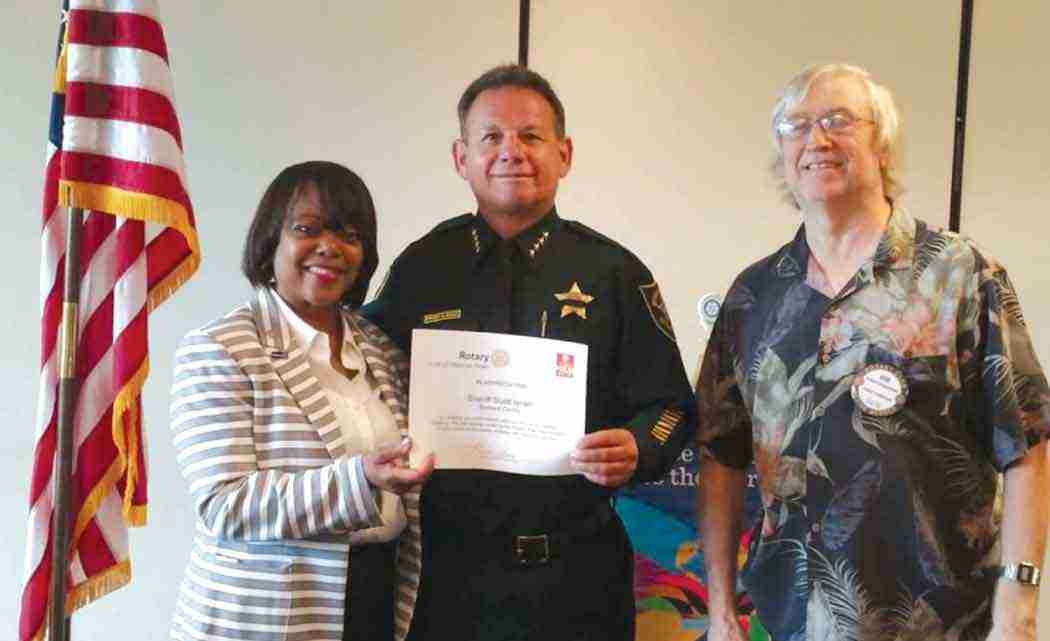PEMBROKE PINES — Therese Homer is accustomed to trailblazing work.
A longtime law enforcement professional, she gained acclaim for a domestic violence program she created as an officer with Opa-locka Police Department. She charted new territory when she became the first black police chief at Miami Dade College’s North Campus.
Although she’s taking a break from police work, Homer has taken her leadership skills into the civic community. Earlier this year she became the first black president of the Rotary Club of Miramar-Pembroke Pines.
The Rotary Club is an international service organization of over 1.2 million members who participate in clubs in more than 200 countries and geographical areas. The clubs provide service in their local communities as well as address global issues.
Homer’s club boasts 27 members, with an age range from the 30s to the 70s. More than half of the members are male. The club is diverse with a mix of white, black and Hispanic members. She is the sole African-Amercan female on the roster.
The clubs meets 12:15 p.m. Thursdays at the Pembroke Lakes Country Club, 10500 Taft St.
Recently, Homer spent time answering questions for South Florida Times to give readers some insight into her new role.
Question: How and why did you get involved in Rotary Club?
Answer: While I was a police officer, working the afternoon shift with the city of Opa-locka Police Department, I was told by my lieutenant to report to a breakfast meeting early one morning at Jackson North Hospital, which was located in Opa-locka. I did and was awarded the Officer of the month for initiating a domestic violence program for the police department. I was kicking and screaming but once there found that I was very interested in what they were doing as it relates to community service. I went back and back again without having to be told and on my own time, I soon became a member because I wanted to do more in the community.
Q: What is your vision for your club?
A: My vision is to build upon the community service projects that the club has been doing but to involve the local police departments and the youths from the Pines Athletic Club, formally PAL with the Pembroke Pines Police Department, and the Police Explorer Programs from the Pines Police Department and the Miramar Police Department. We, hopefully, will be having a first Book Bag Give-a-Way for 280 boys and girls at the Pines Athletic Club on Aug. 15. The Pembroke Pines Police Department will be partnering with us. We have limited resources but are anticipating a Rotary District Grant to cover some of the costs but are seeking donations from community organizations to help us purchase book bags and supplies for the youths.
My vision is also to continue the club’s signature projects, which have been very beneficial to the community, such as 1) the Exceptional Theater Company, which has programs in Dade, Broward, and Palm Beach counties committed to helping children, teens, adults and seniors with disabilities in our community not only to meet their artistic needs but help motivate them to work toward a brighter future; 2) the A.C. Perry Elementary Holiday Book Giveaway, which provide every child from grades 1-6 a book of their choice, with the intent to promote a love for pleasure reading in addition to teaching them that there are adults who care about them; 3) Children’s Harbor program, which keeps foster brothers and sisters together, as well as pregnant or parenting foster teens and their babies in a safe environment. Last year we provided much needed furniture.
We also want to increase membership this year.
Q: What challenges do you face in getting members involved?
A: As with any volunteer service organization, members have other commitments such as work and family. However, I have found that the members in this club are eager to support the projects outlined and are always involved.
Q: What reaction do you get as a black female Rotarian?
A:The reason I love Rotary is because Rotarians do not see the race of a person. They see a Rotarian. I found this to be true when I went to my first International convention in 2005 in Chicago. Rotary was celebrating 100 years. This was my Rotary moment. It changed my life from the moment I got off the airplane and throughout the conference. Everyone I ran into were pleasant and spoke as if they knew me. Once I said I was a Rotarian, the conversations started, even if they did not speak my language, we tried to communicate and we did.
Q: Why should African- and Caribbean-Americans join this organization?
A: Everyone should join Rotary, regardless of race. We are all beings connected by one Source…. No matter what you call it. I choose to call it God. Our purpose is to provide service to those in need. Rotary was once an all white men organization, but they quickly learned that diversity is the key to serving globally.










No Comment